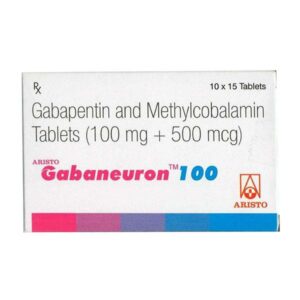GABAPENTIN + METHYLCOBLAMIN
Gabapentin: Gabapentin is a medication that is primarily used to treat epilepsy, nerve pain, and restless legs syndrome. It belongs to a class of drugs called anticonvulsants or antiepileptics.
The exact mechanism of action of Gabapentin is not fully understood. However, it is believed to work by modulating the activity of certain neurotransmitters in the brain, such as gamma-aminobutyric acid (GABA), which helps to reduce the abnormal electrical activity that can cause seizures and nerve pain.
For the treatment of epilepsy, Gabapentin is typically started at a low dose and gradually increased until the desired therapeutic effect is achieved. The exact dosage varies depending on the individual’s age, weight, and response to the medication. It is important to follow the prescribed dosing instructions given by the healthcare provider.
When used for nerve pain or restless legs syndrome, the starting dose of Gabapentin is usually lower and then increased over time. The dosage may be adjusted based on the individual’s response and tolerance. It is important to follow the instructions provided by the healthcare provider.
Common side effects of Gabapentin may include dizziness, drowsiness, fatigue, blurred vision, coordination problems, and weight gain. These side effects are generally mild and may improve over time as the body adjusts to the medication. However, if any side effects persist or worsen, it is important to notify a healthcare provider.
Rare but serious side effects of Gabapentin may include mood changes, depression, suicidal thoughts, severe allergic reactions, and swelling of the hands or feet. It is important to seek medical attention immediately if any of these side effects occur.
Gabapentin may interact with certain medications, such as opioids and other central nervous system depressants, so it is important to inform the healthcare provider about all the medications being taken. It is also important to avoid abruptly stopping Gabapentin, as this can potentially lead to withdrawal symptoms.
Overall, Gabapentin is an effective medication for the treatment of epilepsy, nerve pain, and restless legs syndrome. However, it is important to use this drug under the guidance of a healthcare provider and to report any side effects or concerns promptly.
Methylcoblamin: Methylcobalamin is a form of vitamin B12 that is commonly used as a dietary supplement and medication. It is a coenzyme involved in various metabolic processes in the body.
The primary use of Methylcobalamin is in the treatment of vitamin B12 deficiency, particularly when it results in neurological symptoms. It is also sometimes prescribed for pernicious anemia, diabetic neuropathy, and other conditions associated with vitamin B12 deficiency.
The mechanism of action of Methylcobalamin involves its conversion to coenzyme forms, which are then involved in the methylation of homocysteine to methionine and the conversion of methylmalonyl CoA to succinyl CoA. These processes are essential for the production of DNA and myelin, and for the maintenance of nerve cells.
Methylcobalamin is available in various forms such as tablets, injections, and lozenges. The dosage depends on the condition being treated and the severity of the deficiency. It is typically administered orally or via intramuscular injection. The usual adult dose for vitamin B12 deficiency is 1,000 to 2,000 mcg injected into a muscle once a day for a week, followed by a maintenance dose of 1,000 mcg every one to three months.
As with any medication, Methylcobalamin may cause side effects. The most common side effects include nausea, headache, diarrhea, itching, and swelling at the injection site. In rare cases, individuals with a history of sensitivity to cobalt may experience allergic reactions. Methylcobalamin is generally considered safe and well-tolerated when used as directed, but it is always important to consult a healthcare professional for proper dosage and guidance.


